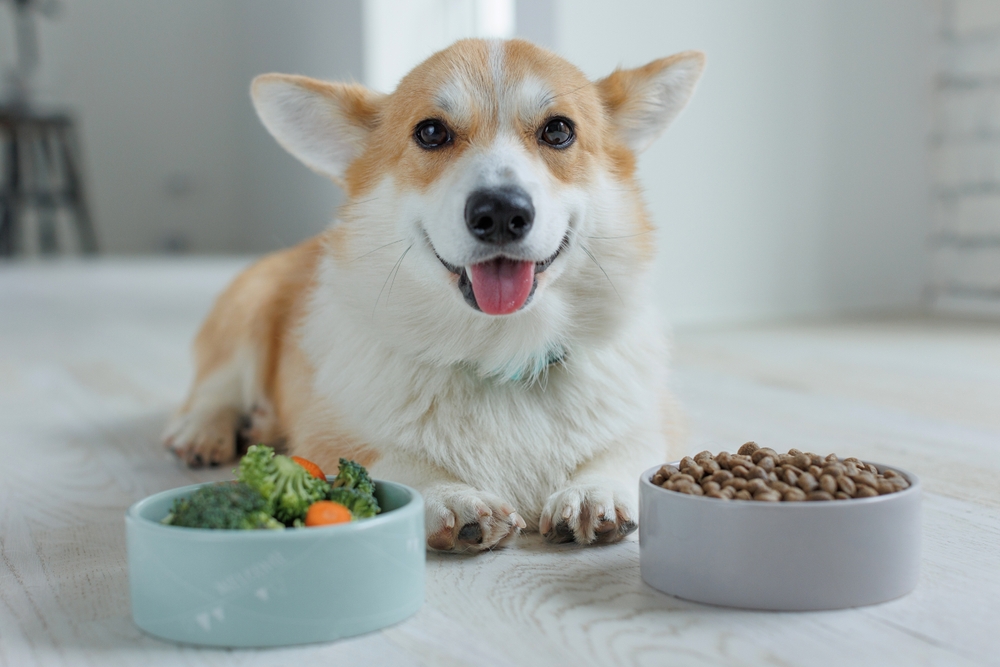Best Vegan Dog Food: 6 Meat-Free Formulas to Try
Updated on September 12, 2024

Meat-free, plant-based foods have become immensely popular in recent years, and that trend has swept into the dog food industry. According to data from 2020, the vegan pet food market is valued at $9.6 billion and is estimated to go up to $16.3 billion by 2030.
Eco-conscious pet parents are increasingly turning to vegan diets for their precious pets, for ethical and health reasons. In situations where the dog is allergic to eggs and certain meats, a vegan diet could also be a good alternative.
While a vegan diet is good for the planet and human health, you may be wondering if it is a healthy option for your dog. Keep reading to find out the benefits and considerations about vegan dog food.
Our Top Vegan Dog Food Picks
Once you’ve decided to go vegan for your dog, it could be overwhelming to see the number of options on the market. Here, you’ll find recommendations on the best vegan dog food formulas.
All featured products are chosen at the discretion of the Vetstreet editorial team and do not reflect a direct endorsement by the author. However, Vetstreet may make a small affiliate commission if you click through and make a purchase.
- Halo Garden of Vegan Recipe
- Natural Balance Vegetarian Dry and Wet Dog Formulas
- Wild Earth Performance Formula Dog Food
- V-Dog
- Petaluma Baked Dog Food
- Bramble
Best Vegan Dog Food: Our 6 Favorite Formulas
Here are some of our top picks of vegan food for dogs:
Halo Garden of Vegan Recipe

Consisting of protein-rich ingredients such as ground peas, chickpeas, pearled barley, oats, as well as non-GMO vegetables, flaxseed, and other wholesome natural ingredients, Halo’s vegan recipe, developed with animal nutritionists and veterinarians, provides all the essential nutrients needed for a balanced diet for your dog. It doesn’t contain any dairy, corn, or wheat. This diet can also alleviate allergic symptoms in dogs sensitive to animal protein.
The food is available in both dry and wet food. If you are looking to supplement your pet’s food, Halo also offers meat-free treats such as Peanut & Pumpkin; Sweet Potato, Carrot & Quinoa; Oats & Blueberry; and Oats, Peanut Butter & Banana.
Highlights
- Vegan formulas were developed with animal nutritionists and veterinarians
- Made with non-GMO vegetables
- Available in dry and wet versions
- Halo also offers complimentary vegan dog treats
Things to Consider
- Some pet parents did not enjoy the smell of this food
- Like most vegan foods, this one is on the expensive side
Natural Balance Vegetarian Dry and Wet Dog Formulas

This tasty vegan chow is designed for adult dogs of all breeds and offers the same nutrients found in meaty diets as the primary protein source. With no animal or dairy products, Natural Balance’s vegetarian dry dog food claims to support healthy digestion and immune function, skin health, and a shiny coat. It doesn’t have any artificial flavors, colors or preservatives and is free of soy and gluten. Main ingredients consist of brown rice, oat groats, barley, peas, potato protein, along with healthy oils, fats, vitamins and supplements.
Natural Balance also offers Ultra Premium Vegetarian Canned Dog Formula, a plant-based vegan wet dog food, providing the same benefits as dry food, but easier to consume by senior dogs or picky eaters.
Highlights
- Available in both dry and wet formulas
- Supports digestion and skin and coat health
- Decent price point for vegan dog food
Things to Consider
- The dry kibble is on the harder side
Wild Earth Performance Formula Dog Food
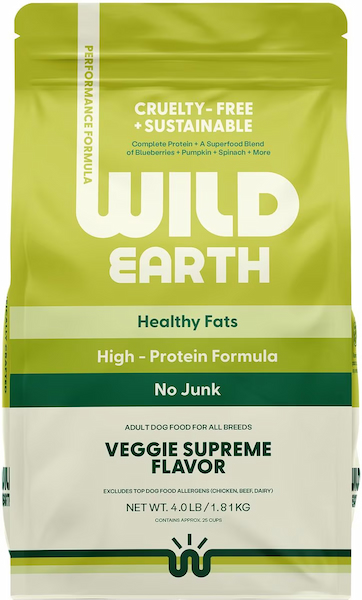
Wild Earth’s Complete Protein Dog Food kibble is made of cruelty-free, superfood ingredients, prebiotics and fibers to help your pet’s overall health as well as the condition of his skin and coat. Some of the key ingredients include dried yeast, chickpeas, peas, oats, pea protein, potato protein, flaxseed meals, vegetables, along with vitamins and supplements. Wild Earth’s food tested high in digestibility in independent studies, meaning that the dog is able to absorb all of the needed protein and nutrients in each bowl.
With Wild Earth, you are helping the environment, too. Their food requires 95 percent less water and emits 96% less CO2 than meat-based kibble. Additionally, it is formulated with the AAFCO (Association of American Feed Control Officials) and European guidelines in mind to ensure quality and safety.
Highlights
- Chickpeas, peas, and flaxseed provide protein
- Meets AAFCO guidelines
- Environmentally friendly formula
- Includes prebiotics to help healthy digestion
Things to Consider
- Only available in a dry food formula
- Reviewers considered it pricey for the quantity
V-Dog
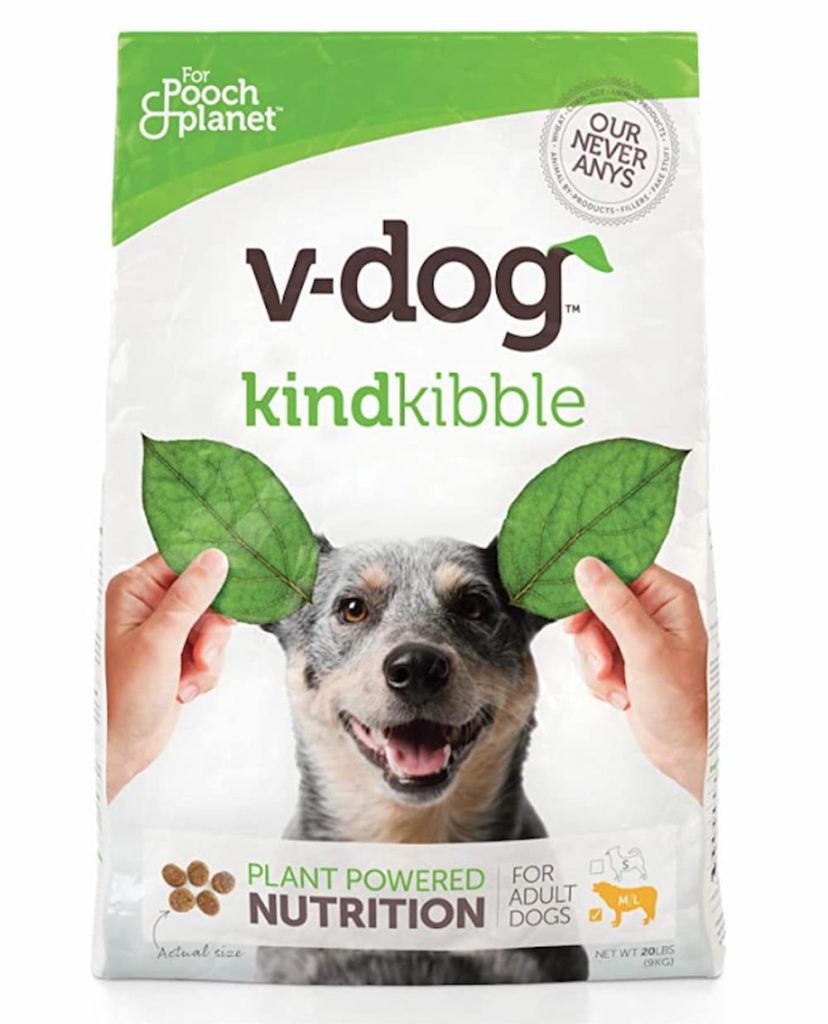
V-Dog’s Kind Kibble packs 24 percent protein and is filled with superfoods, vitamins, and minerals that your pet needs to thrive. Key ingredients such as dried peas, pea protein, brown rice, oatmeal, potato protein, sorghum, lentils, quinoa, along with oils, vitamins and more make this kibble nutritionally complete. Made in California with help from a team of veterinary nutritionists, V-Dog meets AAFCO requirements.
It is free of byproducts, fillers, corn, soy and wheat. V-Dog kibble can be an alternative for dogs suffering from itchy skin, hotspots, digestive issues or allergy symptoms caused by meat diets.
Highlights
- Made in California
- Meets AAFCO standards
- Family-owned company
- Moderately priced for a vegan food
Things to Consider
- Only available in 20- and 30-pound bags
- Kibble is on the large size (try the Mini Bites version for smaller breeds)
- Does not come in a resealable bag
Petaluma Baked Vegan Dog Food
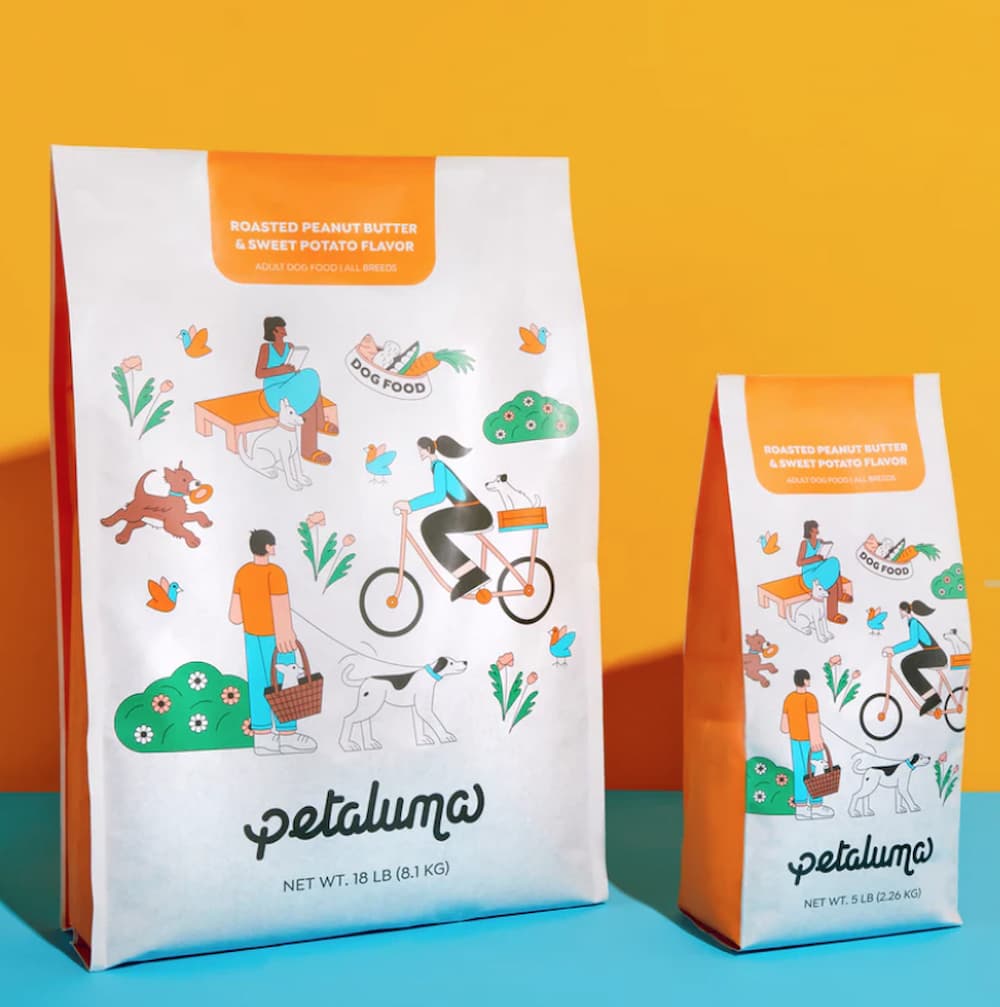
Petaluma is a plant-based dog nutrition company designed by veterinary scientist Dr. Blake Hawley. Their baked Roasted Peanut Butter and Sweet Potato dog food uses protein-packed plant materials like organic chickpeas, brewer’s yeast, organic oats and barley, organic peanut butter, and sweet potatoes. The food is designed to offer a complete amino acid profile – which can be a concern with a vegan diet for dogs. Additionally, Petaluma is a B Corporation and is Climate Neutral Certified, showing that the brand takes steps to minimizing environmental impact.
Highlights
- Veterinarian formulated to be complete and balanced
- Organic ingredients and environmentally friendly practices
- Two different bag sizes available (5-pound and 18-pound)
- Pet owners can subscribe and save 30%
Things to Consider
- Only one flavor of food currently available
- It includes peanut butter, so pet owners with peanut allergies should be aware
- Not available in stores
- Not recommended for puppies
Bramble
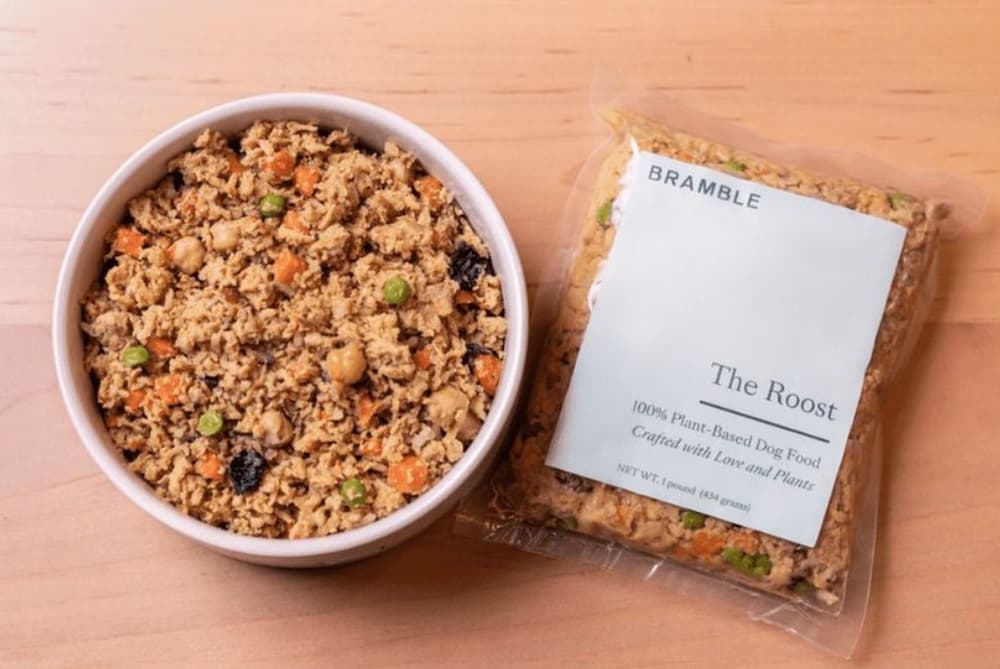
Bramble’s plant-based dog fresh food is formulated by board-certified veterinary nutritionists and is lab tested to make sure that it contains all the amino acids and essential nutrients needed for dogs. This fresh dog food is delivered right to your door, and is ready to serve. It’s made with high quality, human grade whole foods that are gently cooked to maximize their nutritional value. The food meets the nutritional standards established by the AAFCO Dog Food Nutrient Profiles for adults. All you need to do is just heat and serve and watch your dog lick the bowl clean.
The Cowbell recipe is made with lentils, sweet potatoes, peas, and apples, and is ideal for dogs with grain sensitivities. The Roost recipe is another high-protein diet that combines potatoes, chickpeas, and veggies such as butternut squash and carrots.
Highlights
- Two different vegan recipes to try
- Fresh food – not kibble
- Meets AAFCO standards
- Food delivered right to your door
- Recipes formulated by veterinary nutritionists
- Have a topper option if you want to use Bramble with other foods
Things to Consider
- Limited buying options
- Only offered as a subscription service
- Cost is higher than other vegan foods
What Is Vegan Dog Food?

Vegan dog food is dog food made without the use of any animal products or ingredients. This food may be available in both wet and dry formulations.
Most vegan food is plant-based and features protein-rich vegetables and grains such as chickpeas, peas, barley, flaxseed, quinoa, lentils, brown rice, and oatmeal.
Vegan Dog Food Buying Guide

Similar to purchasing any pet food, pet parents need to pay attention to a number of factors when considering a vegan diet for their dogs. These considerations include meeting certain standards, looking into feeding trials, and researching formulations, among other factors.
Here are some things to keep in mind before choosing a vegan dog food
Standards and Labels
Dr. Jamie Richardson, head of veterinary medicine at Small Door Veterinary in New York City strongly recommends choosing a dog food that meets the AAFCO standards and that it’s stated on the label.
“It is an indicator of nutritional adequacy – it means your pet’s diet is balanced and complete.”
AAFCO sets the criteria for pet and animal foods throughout the country, and all vegan dog food brands need to meet its standards to be considered a balanced and complete diet. It’s also important to check the label for which life stage the food is approved.
Age and Health Considerations
“Healthy adult dogs are probably the best candidate if a pet parent would like to try feeding a vegan diet,” recommends Dr. Emily Wilson, a veterinarian at Fuzzy Pet Health telemedicine service. To ensure that your dog is getting the proper amino acids, Wilson suggests checking their plasma amino acid and serum vitamin B12 levels through blood work every two to three months.
For puppies, however, Wilson urges caution in feeding a vegan diet. “They have a very small margin for nutritional requirements and feeding a more novel type of diet to a growing puppy can increase certain risk factors for long term health.” It’s important to feed a growing dog a nutritionally balanced food up to one year of age.
A vegan lifestyle may not suit dogs that have certain underlying health conditions, says Richardson and recommends consulting your veterinarian for specific advice.
Feeding Trials and Nutritional Analysis
Richardson says good brands “undergo rigorous quality control and should be scientifically tested to ensure they provide the required nutrient mix.” Independent testing results are often shared on the brand’s website.
According to Wilson, nutritional analysis, which is either stated on the brand’s label or website, provides more information about the content of the food and the manufacturer’s good practices during production.
Consumer Reviews
Reviews, as for any food product, can help customers determine the quality and palatability of diets. Reviews can help you understand how the food worked (or didn’t work) for other dogs. They can also help you better understand food odors, kibble shape and size, and whether pet owners feel like the food is a good value
However, Richardson states that the most important recommendation should come from your veterinarian, “as they have the most up-to-date knowledge about different brands’ ingredients, nutrient mix, and quality control procedures”.
Food Formulations
Choosing the type of the dog food – dry, wet, fresh, or freeze-dried – is often a personal preference of the pet parent as well as the dog, states Wilson. Wet food contains a higher water content, and dry food may be better for dogs that are grazers and have access to a food bowl throughout the day.
Vegan Dog Food FAQs

Can dogs be vegan?
Yes, dogs can be vegan if it is a lifestyle and diet type elected by their pet owners. It’s recommended that vegan food for dogs be approved by a veterinary nutritionist and meet AAFCO standards. Pet parents should also check with their vet about their dog’s health conditions, age, and lifestyle before feeding a vegan dog food.
Is vegan dog food healthy?
It is possible for dogs to be healthy on a vegan diet, so long as careful consideration is given to the type of food given.
With a vegan diet, Wilson says, there can be concern for insufficient amino acids as well as possible deficiency in certain fatty acids and vitamins.
According to Richardson, taurine, an amino acid essential for health and heart function, can be found in small amounts in non-animal sources, but they don’t generally provide enough on their own. Taurine deficiency in dogs can lead to dilated cardiomyopathy (where the heart becomes enlarged and isn’t able to pump as effectively), warns Richardson. “Lack of taurine can also lead to growth, eyesight, and reproductive issues.”
Unlike humans, who can obtain vitamin D from sunshine, dogs cannot get it through exposure and rely predominantly on animal sources for this essential vitamin. “Vitamin D helps to regulate calcium levels in the body, and deficiency can lead to weakened bones, poor muscle activity, heart disease, and a number of other dangerous conditions,” says Richardson.
Can dogs eat plant-based meat?
There are several plant-based meat options available for humans, but pet parents need to refrain from giving these to their dogs. These products are often highly processed and Wilson states that they typically contain high levels of salt and fat, as well as spices, such as onion or garlic.
“Increased salt and fat consumption can cause gastrointestinal upset in dogs,” she explains. “Onion and garlic can be toxic to dogs and should be avoided when possible.”


